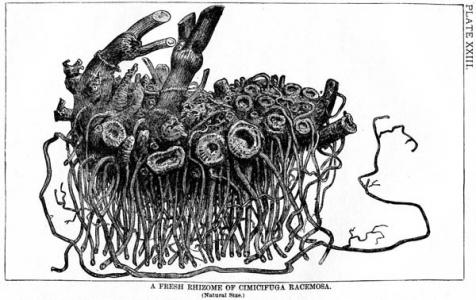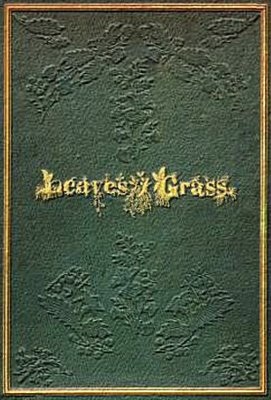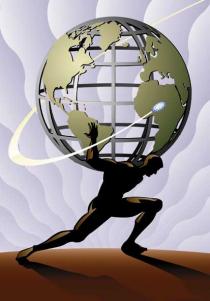Serendip is an independent site partnering with faculty at multiple colleges and universities around the world. Happy exploring!
Notes Towards Day 3: Thinking Rhizomically

Reporting in, afterwards, on our rhizomic discussion
![]()
In 1980, Giles Deleuze and Felix Guattari wrote a now-infamous essay called "Rhizome VS. Tree," in which they developed what they called an "image of thought," based on the botanical rhizome, that "apprehends multiplicities."
“To plot a center-point, they suggest, is the first step towards misunderstanding something that functions rhizomatically.....The rhizome is acentered, non-hierarchical, nonsignifying system without a General and without an organizing memory or central automaton, defined solely by a circulation of states.”
![]()
They opposed it to an arborescent conception of knowledge, which worked with dualist categories and binary choices. A rhizome works with horizontal and trans-species connections, while an arborescent model works with vertical and linear connections.
![]()
In 2007, in the essay we read for today called "Database as Genre," Ed Folsom appropriated that image: "Genre is a kinship network, something like...the rhizome, the subterranean stem that grows every which way and represents the nomadic multiplicity of identity--no central root but an intertwined web of roots." That's the pattern/non-pattern we'll be tracing today.
I. but first: some coursekeeping
sign-in sheet: here today--
and box in one day when you'll write up the class summary
since we're turning today to digitalization,
thought we'd start w/ webby sort of intros
(remember your categories from a week ago-->
Oregonians, atheists, sisters, vegetarians?)
name yourself and your connection to another
turn on Thursday from MLA-ish pronouncements
on genre-making in general to the emergence
of a particular new genre, that of the blog
who among you blogs outside of class on live journal or....?
we'll rely heavily on your experience/expertise
read also some theory:
Writing as Jo(e), "Blogging as Emerging Genre" (2005)
Laurie McNeill, "Teaching an Old Genre New Tricks:
The Diary on the Internet," Biography (2003)
we'll be thinking about the history of blogs, as well as
looking @ what's happening now, where this might go...
Molly: comparing genre to a family tree in the way it travels and changes.
(a tree? or a rhizome??)
 |
who's in this family tree/root system?
who are the ancestors/what are the roots of the blog?
is it a modern form of diary, journal, commonplace book, or....?
how is it like/how has it diverged?
how can you trace such a history, turn correlations into causations?
are we trying to do this "too soon"? (thinking evolutionarily)
spleen-fiend: humans only see themselves as a drastically different species because all the intermediate species between humans and monkeys are extinct .... Humans have to search for patterns over long periods of time and then categorize them ... think about genre in the context of time periods; maybe something can't truly be labeled until someone can look back on history and see the big picture.
(comparable to the argument about not reading contemporary lit:
no time to judge it in the light of ages, see its worth outside its era...)
nonetheless! will go on creating another test case
by blogging weekly on our group page
how's that working so far? (18 ppl. in class/20 members/16 postings)
what pleasures/discomforts?
happy to see, this week, a little more
back-and-forthing/back-talking/question-asking:
aybala50 (responding to rachelr [& TPB1988], who'd said that genres don't limit lit):
This creation of genre for literary work is very similar to the labeling of humans in everyday life....we are constricted in these labels and we just become another genre.
I think that genres do in fact limit literature. Labeling a work of literature as a specific genre traps that literary work into a 'box'. A certain expectation from the literary work arises for readers that search for something to read under a certain label.
xhan (just joining us, and responding to TPB1988, who'd asked "what would life be if one did not have a simple set of distinctions to differentiate an orange from an apple"?):
it may be human nature to want to label and define literature, since it is our way of assigning meaning to what we read or hear, these ontological names, or ways we classify genres is constantly evolving, and an ever-growing process
@ midnight, a conversation began between rachelr and aseidman:
rachelr: archives and databases are so akin to genres, just another way for humans to try to understand....literature has to be organized some way
aseidman: and yet...
whether or not they were in a book,
sat alone,
were re-arrangeable,
or were set in stone...
[Whitman's works were] are all still very poetic...for all of their unusual and mutable nature, [they] fit very well into the genre of poetry.
to keep nudging conversation, rather than stand-alone claims,
highlight a couple other postings I wanted to understand better:
nk0825: Sometimes a definition is more helpful when it detaches itself from the object at hand and lets the object speak for itself.
jrlewis/Jeanette Winterson: an immediate challenge to genre-boxing but there is to, an invitation to believe
jrf: the in-between nature of the images seemed to cause discomfort to me and others. Why should ... in-between objects elicit disgust? ... Why is maintaining the open mind to the evolution of genre that Dimock and Owen call for so difficult? Do we need computers to do this for us? Does the emergence of technology that eliminates the idea of an "authoritative" version of a particular story or work, such as that behind the Walt Whitman Anthology, make it more possible for us to wrap our minds around the existence of "in-between" objects and stories?
Let's see. From a Collection of Essays on The Changing Profession:
Ed Folsom, Database as Genre: The Epic Transformation of Archives
Whitman tested the rigid quality of our categorical systems: genre-bending/
battled with the "feudal mind-set"/division/discrimination that genre encouraged
his "Leaves of Grass" were "a Manifesto of nomadic thought,"
casually related to a motley tangle of other work:

"Look closely at Whitman's design of the floriated words 'Leaves of Grass' on the cover of his first edition -- the letters obscured with leaves and dangling roots, the title trope a continual reminder of surprising connections (leaves of grass as death emerging into life again and again), of transfer of atoms, of interpenetrating force fields .... Whitman's work ... is causally related to a motley tangle of other work .... Scripture and journalism, epic and etiquette manual, sublime transcendental philosophy and obscene filth....
What happens, then, when we move Whitman's rhizomorphous work into a database, put it online, allow for the webbed roots to zig and zag with everything the database incorporates?" (Folsom, 1573).
Folsom follows Manovich's provocative claim that
"the database represents the world as a list of items, and it refuses to order this list. In contrast, a narrative creates a cause-and-effect trajectory of seemingly unordered items (events). Therefore, database and narrative are natural enemies....database..threatens to displace narrative, to infect and deconstruct...endlessly....
He argues that, since for Whitman, "the world was a kind of preelectronic database,"
he was "an early practitioner...of the database genre," with a "relentless appetite for details,
for every speck...democratic beauty was fullness, not exclusion, and required...completeness, not a discriminating eye."
go exploring for yourself in the Walt Whitman Archive; test out Folsom's claims
it would be a great project for your upcoming paper on the digital humanities
Responses:
Peter Stallybrass, Against Thinking
digital information profoundly undermines academic elite control over the circulation of knowledge
gatekeepers' work is increasingly problematic
renewed sense of language as a "tissue of quotations" from which we cannot remove ourselves:
"Having 'inventory' is a requirement for 'invention'...making information reuseable."
databases can help free us from the tyranny of proprietary authors,
solitary thinkers who produce knowledge our of their own minds-->
rediscover a pedagogy that preceded regime of originality:
imitation, inspiration, use of common treasury
give up claim to intellectual property, in construction of free circulation of knowledge
Jerome McGann, Database, Interface, and Archival Fever
on the importance of a user interface in searching database:
all works are marked data, all documents multiply coded
all digital instruments require severe categorical forms/
sharp, disambiguated distinctions/elementary abstract structures
Meredith McGill, Remediating Whitman
don't misconstrue media shift as liberation
digital databases are still very/too constrained by print conventions;
WWArchive organized around the book,
w/out a sense of the provisionality of his writing
cf. The Vault @ Pfaff's, w/ its access to social locations of culture,
beyond the closed circuit of life-and-work
cf. also the Colex interface of the NINES project
which incorporates connections that readers construct
[also great projects for you all: to explore these possibilities]
Jonathan Freedman, Whitman, Database, Information Culture
links Folsom's project to Google's utopian aspiration--and cautions that
"a space of ever-expanding possibilities...generates an ever-increasing need
for guidance, classification, just plain ordering"
"the seeming conditions of our freedom..only conceal our greater constraint:"
what is the relationship among the items on Whitman's lists of "eddying information"?
Whitman self-valorizes/hyperbolizes his "will to database"; Folsom, Google veil theirs,
occlude choices, decisions, inclusions, exclusions that go into making their databases
(they include only recent responses; only work from Euro-American world)
important not to identify w/technological forces, but rather to attend to the engaged/distanced/skeptical/sympathetic stance of the observing citizen,
who does this work as a way of bringing herself into the experiences of others
Katherine Hayles, Narrative and Database: Natural Symbionts
replaces the metaphor of natural enemies w/ that of
natural symbionts in a mutually beneficial relation/
complex ecology of narrative and database
databases are relational (not hierarchal/tree-based)
and self-contained (w/ formally closed logic systems);
in strong contrast w/ narrative, which always contains
more than the table of contents/chapter titles indicate:
different species:
reliance on enumeration, vs. gestures toward the inexplicable;
speaking that which can explicitly be spoken; vs. inviting in the unknown
(yet: limited, linear sequentiality of language, vs. possibilities of the "data pour")
spatial displays vs. temporal orderings (space & time co-exist);
global dynamics vs. pervasive local levels
expansion of databases --> spawning new narratives/interpretative possibilities
Ed Folsom, Response
accepts some revisions/resists others
database does not handle completion well
it is voracious and thrives on supplementation
it invites big imagining; makes our students our scholarly competitors
essential counter-technology, innate desire to
pile up/absorb what doesn't immediately sort into narrative
meaning is always exceeded by the data
(story from SJPP Writing Group: creating narratives or searchable archival documents?)
Bruce Robbins, Afterword, proposes a conceptual experiment:
imagine literature depts hiring hiring by genre (vs. period organization of field)
indulge in momentary alienation from
familiar, narrow, strong commitment to historical periodization
need genre be conservative? (metaphors of border police, passports)
rivalry of national literatures, w/ originary, foundational epics
revalue comparison (no mute ground; always invidious, implicitly unfair)
imagine literature as the antinormative norm, antigenre genre: purely self-referential
Moretti: genre as temporary structures that last only for some time
period and nation: pseudo-anthropocentric, lazy norms
throw open question of literature’s temporal and geographic scale:
reading in “deep time” destabilizes, de-autonomizes category of literature
Genre tempts us beyond the period-by-period agenda of our ordinary studies."
III. Test this out by reading the BMC English Department
last week we asked: what have you studied?
today, move up one level of analysis: how is the department organized?
how--following the logic of the arguments above (or
others you find more compelling)--might/should it be?
what's missing?
what sorts of specialists should we be hiring?
should we be hiring specialists?
IV. return to conversation between me & aseidman @ end of last class:
what should citizens of the 21st c. be reading?
what should someone preparing to teach h.s. English study?
what is the relationship between those two "genres"?
should we be re-making the study of English lit
so that it better prepares students to be 21st c. citizens?
 |
 |
Reporting in on our rhizomic discussion


